初中常用的前缀后缀.
- 格式:ppt
- 大小:1.37 MB
- 文档页数:28
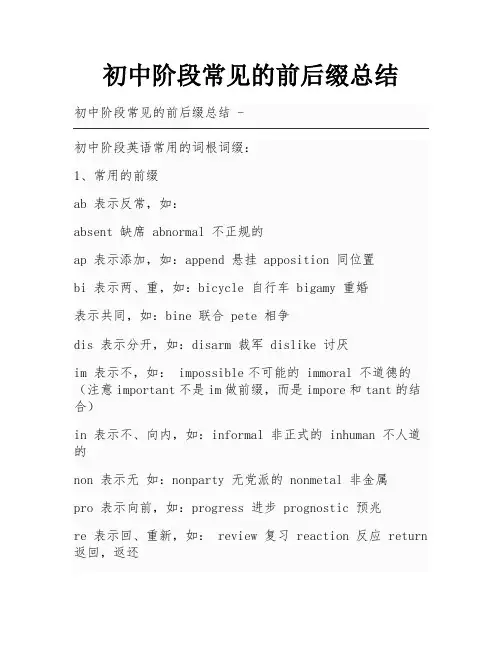
初中阶段常见的前后缀总结初中阶段英语常用的词根词缀:1、常用的前缀ab 表示反常,如:absent 缺席 abnormal 不正规的ap 表示添加,如:append 悬挂 apposition 同位置bi 表示两、重,如:bicycle 自行车 bigamy 重婚表示共同,如:bine 联合 pete 相争dis 表示分开,如:disarm 裁军 dislike 讨厌im 表示不,如: impossible不可能的 immoral 不道德的(注意important不是im做前缀,而是impore和tant的结合)in 表示不、向内,如:informal 非正式的 inhuman 不人道的non 表示无如:nonparty 无党派的 nonmetal 非金属pro 表示向前,如:progress 进步 prognostic 预兆re 表示回、重新,如: review 复习 reaction 反应 return 返回,返还un 表示不、非,如:unhappy 不快乐的 unbalance 失去平衡unlike不像(注意区别dislike“不喜欢”的意思)2、常用的后缀al 表示人、物,如:rival 竞争者 mural 壁画cy 表示状态、职位,如:bankruptcy 破产 captaincy 船长er 表示人、物,如:teacher 老师 singer歌手 writer作家waiter服务员 worker打工人 cooker 厨具(注意er还是大部分形容词的比较级后缀)able 表示可以的,是形容词的后缀。
如: movable 可移动的passable 可通行的 possible可能的fortable,changeable,reliable,suitable,acceptableful 表示充满,是形容词的后缀。
如: beautiful 美丽的useful 有用的 wonderful美妙的 awful糟糕的grateful感激的 hopeful抱有希望的 helpful有帮助的careful小心的(这些词后面加ly变成对应的副词)ous名词或名词词根与-ous后缀结合转化为形容词,是形容词的后缀。
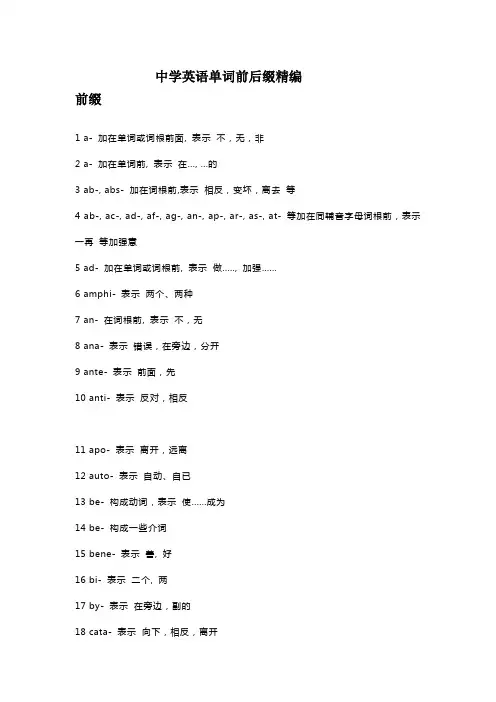
中学英语单词前后缀精编前缀1 a- 加在单词或词根前面, 表示不,无,非2 a- 加在单词前, 表示在..., ...的3 ab-, abs- 加在词根前,表示相反,变坏,离去等4 ab-, ac-, ad-, af-, ag-, an-, ap-, ar-, as-, at- 等加在同辅音字母词根前,表示一再等加强意5 ad- 加在单词或词根前, 表示做....., 加强......6 amphi- 表示两个、两种7 an- 在词根前, 表示不,无8 ana- 表示错误,在旁边,分开9 ante- 表示前面,先10 anti- 表示反对,相反11 apo- 表示离开,远离12 auto- 表示自动、自已13 be- 构成动词,表示使......成为14 be- 构成一些介词15 bene- 表示善, 好16 bi- 表示二个, 两17 by- 表示在旁边,副的18 cata- 表示向下,相反,离开19 circum- 表示环绕,周围20 co- 表示共同,通常放元音词根前21 col-, cor- 在同辅音词根前, 表示共同22 com-, con- 表示共同23 contra - 表示反对,相反24 counter - 表示反对,相反25 de- 表示去掉,变坏,离开,变慢,向下等26 de- 表示使....成为,加强等27 deca- 表示十28 deci- 表示十分之一29 demi- 表示半30 di- 表示二个,双31 di- 表示使...变成,分开,离开32 dia- 表示穿过,二者之间33 dif- 和辅音重复表示不,否定,分开34 dis- 表示不,消失掉35 dis- 表示分开,分离36 dys- 表示坏,不良37 e-, ef- 表示出,出来,38 em-, en-, 表示进入... 之中,包围39 em-,en-, 表示使..... 进入状态40 endo- 表示内部41 epi- 表示在...上,在...周围,在...后面42 eu- 表示好,优秀43 ex- 表示出,出去44 ex- 表示前面的,前任的45 exo- 表示外部的,外面46 extra- 表示以外的,超过的47 fore- 表示前面,预先48 hecto- 表示百,许多49 hemi- 表示半50 hepta- 表示七51 hetero- 表示异类,异种52 hexa- 表示六53 holo- 表示全部'54 homo- 表示同类的55 hyper- 表示超过,太多56 hypo- 表示下面,次等57 il-, ir- 辅音重复表示不,无58 il-,ir- 表示使.....成为,进入59 im-, in- 表示不,无,非60 im-,in- 表示向内,进入61 inter- 表示在..... 之间,相互62 intra- 表示在内,内部63 intro- 表示向内,入内64 iso- 表示等, 同65 kilo- 表示一千66 macro- 表示宏传,大67 mal-; male 表示坏,恶68 meta- 表示超过, 改变69 micro- 表示微,小70 milli- 表示千,千分之一71 mini- 表示小72 mis- 表示错误,坏73 mono- 表示单个,一个74 multi- 表示多,很多75 neo- 表示新的76 non- 表示不,非77 ob- 表示逆,倒,加强意义78 octa- 表示八; 亦作octo79 omni- 表示全部,到处80 out- 示超过,过度81 out- 表示出去,过时82 over- 表示过度,过份83 over- 表示翻转84 over- 表示在... 之上85 paleo- 表示古,旧86 pan- 表示广泛的87 para- 表示半,类似,辅助88 para- 表示旁边89 para- 表示降落伞90 pen- 表示近似,差不多91 penta- 表示五92 per- 表示贯穿,自始至终93 per- 表示假,坏94 peri- 表示周围,靠近95 poly- 表示多96 post- 表示在后面97 post- 表示邮件,邮政98 pre- 表示...前的,预先99 pro- 表示赞同,亲...100 pro- 表示向前,在前101 pro- 表示很多...102 proto- 表示原始...103 pseudo- 表示假,伪104 quadri-,quadru- 表示四105 quasi- 表示类似,准106 re- 表示向后,相反107 re- 表示一再,重新108 retro- 表示向后,倒退109 se- 表示分开,离开,区别开110 semi- 表示半111 sept-,septi- 表示七112 sex-, sexi- 表示六113 step- 表示后,继或前夫(妻)所生114 stereo- 表示立体115 sub- 表示在下面,次一等,副手116 sub- 表示接近,靠近117 suc-, suf-, sup-, sur- 等辅音重复表示在...下面118 super- 表示在...上面119 super- 表示超级,超过,过度120 supra- 表示超...121 sur- 辅音不重复表示超过,在上面122 sus- 表示在... 下面123 sym-, syn- 表示共同,相同124 tetra- 表示四125 trans- 表示横过,越过126 trans- 表示变换,改变';转移127 tri- 表示三128 twi- 表示二、两129 ultra- 表示极端130 ultra- 表示超出,超过131 un- 表示不,无,非,没有132 un- 表示打开,解开,弄出133 under- 表示在...下,在...之内134 under- 表示不足,不够135 under- 表示副手 3136 uni- 表示一个、单一137 vice- 表示副138 with- 表示向后,相反后缀139 -ability 表名词,能...;性质140 -able 表形容词,可...的,能...141 -ably 表副词,能...地142 -aceous 表形容词,具有...特征的143 -acious 表形容词,有特征的,多...的144 -acity 表名词,有...倾向145 -acle 表名词, ... 物品,状态146 -acy 表名词, ...性质,状态147 -ad 表名词,...东西,状态148 -ade 表名词, 表示状态,物品149 -ade 表示个人或集体150 -age 表示:费用151 -age 表示场所,物品152 -age 名词后缀,表示状态,总称153 -ain 表名词,...人154 -air 表名词,人、物155 -aire 表名词,...人156 -al 表形容词,...的157 -al 表名词,人,物,状态158 -ality 表名词,状态,性质159 -ally 表副词,由al+ly 构成,...地160 -an 表名词和形容词,...地方,...人161 -ance 表名词,性质,状况162 -aneity 表名词,表示性质,状态163 -aneous 表形容词,...有; ...特征的164 -ant 表形容词,...的165 -ant 表名词,...人166 -ant 表名词,...剂167 -ar 表形容词,...的168 -ard 表名词,不好的人169 -arian, 表形容词或名词,...的(人) 170 -arium 表名词,地点,场所171 -ary 表名词,人,场所,物172 -ary 表形容词,...的173 -ast 表名词,...人,物174 -aster 表名词,不怎么样的人175 -ate 表动词,做,造成176 -ate 表形容词,具有...的177 -ate 表名词,人或地位178 -atic 表形容词,有...性质的179 -ation 表名词,行为,过程,结果180 -ative 表形容词,有...倾向(性质)的181 -ator 表名词,通常由ate结尾的动词而来,做事的人或物182 -atory 表名词场所,地点183 -atory 表形容词,有...性质的184 -cy 表名词,也作-acy, 性质,状态185 -dom 表名词,状态或领域186 -ee 表名词,被动或主动的人187 -eer 表名词,... 人员188 -el 表名词,人或物189 -en 表动词,变成190 -en 表形容词,由...制成的,通常加在名词后面191 -en 表名词,人或物192 -ence 表名词,性质,状态193 -ency 表名词,ence 的变体194 -enne 表名词,女性195 -ent 表形容词,...的196 -ent 表名词,...药剂197 -ent 表名词,...人198 -eous 表形容词,有...的199 -er 表动词,反复做200 -er 表名词,物品,机器201 -er 表名词,...人202 -ern 表形容词,...方向的203 -ern 表名词,...场所204 -ery 表名词,场所,地点205 -ery 表名词,行为,情况206 -esque 表形容词,如...的207 -ess 表名词,女性,雌性208 -et 表名词,小东西209 -etic 表形容词,属于...的210 -ette 表名词,小的东西或状态211 -ety 表名词,状态212 -eur 表名词,...人213 -faction 表名词,达到的状态,由-fy转化而来214 -fic 表形容词,产生...的215 -fication 表名词,由fic变化而来216 -fier 表名词,人或物,由-ify转化而来217 -fold 表形容词或副词,倍,双重218 -form 表形容词,有...形状的220 -ful 表名词, 满,量221 -fy 表动词, ...化,成为... ,更多时候作-ify 222 -hood 表名词, 时期,性质等223 -ia 表名词, 某种病224 -ia 表名词, 总称,状态225 -ial 表形容词,有...的226 -ian 表名词,某种人227 -ian 表形容词, ...国家的228 -ibility 表名词,具备...性质的229 -ible 形容词能...的230 -ic 表形容词, ....的,有时作-tic231 -ic 表名词,某种药232 -ic 表名词,人或学科233 -ical 表形容词,...的234 -ice 表名词,行为,状态235 -ics 表名词,学科,学术236 -id 表形容词,如...的237 -ie 表名词,小东西或人238 -ier 表名词,人或物240 -ile 表名词,物体241 -ine 表形容词,...的242 -ine 表名词,人或女人243 -ine 表名词,状态, 药物等244 -ing 表形容词,正...的,令人...的245 -ing 表名词,行业246 -ing 表名词,物品247 -ing 表名词,状态248 -ion 表名词,动作或状态分为--sion和--tion两种249 -ion 表示某种物,用品250 -ior 表形容词,较...的251 -ious 表形容词, ....的252 -ise 表动词后缀,和-ize 相同,是-ize 的变体,...化253 -ise 表名词,物品,状态254 -ish 表形容词,象...一样,有的... ,通常放在一具体名词后255 -ish 表动词,造成...256 -ish 表示国家的或语言257 -ism 表示学术或学术流派258 -ism 表示行为, 现象,状态259 -ism 表示疾病260 -ism 表示具备某种性质261 -ism 名词,表示各种主义,宗教262 -ist 表名词,表示信仰者,专家或从事人263 -ist 以-ist 结尾的单词,不少同时可做名词和形容词用。
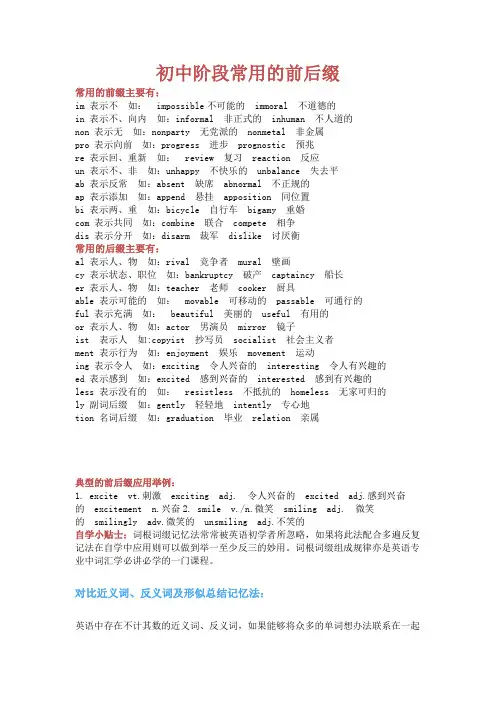
初中阶段常用的前后缀常用的前缀主要有:im 表示不如:impossible不可能的immoral 不道德的in 表示不、向内如:informal 非正式的inhuman 不人道的non 表示无如:nonparty 无党派的nonmetal 非金属pro 表示向前如:progress 进步prognostic 预兆re 表示回、重新如:review 复习reaction 反应un 表示不、非如:unhappy 不快乐的unbalance 失去平ab 表示反常如:absent 缺席abnormal 不正规的ap 表示添加如:append 悬挂apposition 同位置bi 表示两、重如:bicycle 自行车bigamy 重婚com 表示共同如:combine 联合compete 相争dis 表示分开如:disarm 裁军dislike 讨厌衡常用的后缀主要有:al 表示人、物如:rival 竞争者mural 壁画cy 表示状态、职位如:bankruptcy 破产captaincy 船长er 表示人、物如:teacher 老师cooker 厨具able 表示可能的如:movable 可移动的passable 可通行的ful 表示充满如:beautiful 美丽的useful 有用的or 表示人、物如:actor 男演员mirror 镜子ist 表示人如:copyist 抄写员socialist 社会主义者ment 表示行为如:enjoyment 娱乐movement 运动ing 表示令人如:exciting 令人兴奋的interesting 令人有兴趣的ed 表示感到如:excited 感到兴奋的interested 感到有兴趣的less 表示没有的如:resistless 不抵抗的homeless 无家可归的ly 副词后缀如:gently 轻轻地intently 专心地tion 名词后缀如:graduation 毕业relation 亲属典型的前后缀应用举例:1. excite vt.刺激exciting adj. 令人兴奋的excited adj.感到兴奋的excitement n.兴奋2. smile v./n.微笑smiling adj. 微笑的smilingly adv.微笑的unsmiling adj.不笑的自学小贴士:词根词缀记忆法常常被英语初学者所忽略,如果将此法配合多遍反复记法在自学中应用则可以做到举一至少反三的妙用。
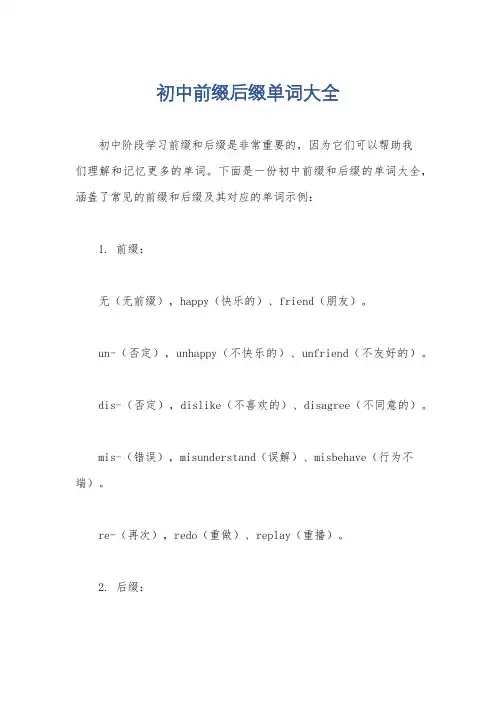
初中前缀后缀单词大全初中阶段学习前缀和后缀是非常重要的,因为它们可以帮助我们理解和记忆更多的单词。
下面是一份初中前缀和后缀的单词大全,涵盖了常见的前缀和后缀及其对应的单词示例:1. 前缀:无(无前缀),happy(快乐的)、friend(朋友)。
un-(否定),unhappy(不快乐的)、unfriend(不友好的)。
dis-(否定),dislike(不喜欢的)、disagree(不同意的)。
mis-(错误),misunderstand(误解)、misbehave(行为不端)。
re-(再次),redo(重做)、replay(重播)。
2. 后缀:无(无后缀),help(帮助)、jump(跳跃)。
-er(人或物),teacher(教师)、writer(作家)。
-ful(充满),helpful(有帮助的)、grateful(感激的)。
-ing(进行中),running(跑步的)、eating(吃饭的)。
-ed(过去式或完成式),played(玩过的)、finished(完成的)。
3. 前缀和后缀的组合:un+ -able(能够),unbelievable(难以置信的)、unbreakable(坚不可摧的)。
dis+ -ful(充满),disrespectful(不尊重的)、distrustful(不信任的)。
re+ -ing(进行中),rebuilding(重建中的)、relearning (重新学习的)。
这只是一小部分常见的前缀和后缀单词示例,还有很多其他的组合和变化。
通过学习前缀和后缀,我们可以更好地理解和记忆单词的意义和用法,提高我们的词汇量和语言表达能力。
希望这个单词大全对你有帮助!。
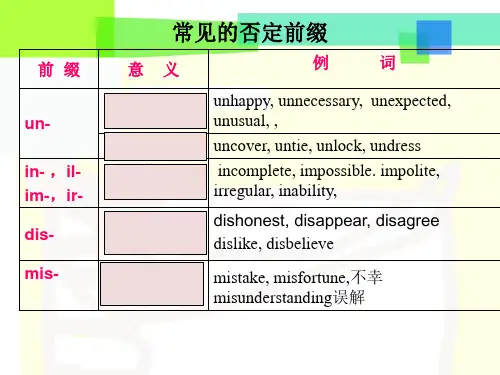
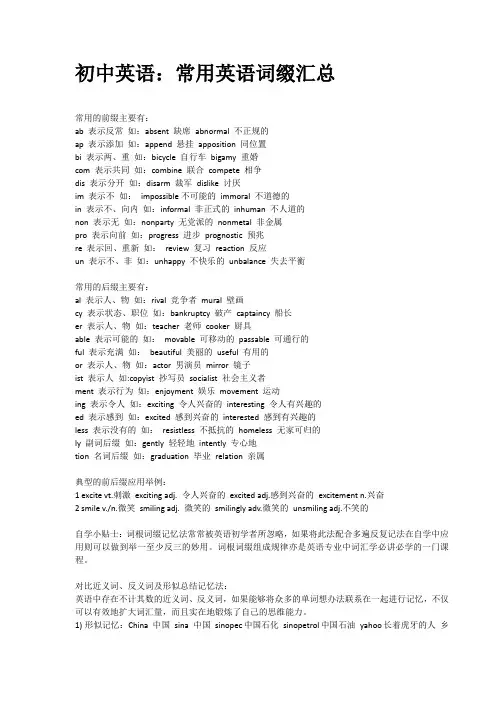
初中英语:常用英语词缀汇总常用的前缀主要有:ab 表示反常如:absent 缺席abnormal 不正规的ap 表示添加如:append 悬挂apposition 同位置bi 表示两、重如:bicycle 自行车bigamy 重婚com 表示共同如:combine 联合compete 相争dis 表示分开如:disarm 裁军dislike 讨厌im 表示不如:impossible不可能的immoral 不道德的in 表示不、向内如:informal 非正式的inhuman 不人道的non 表示无如:nonparty 无党派的nonmetal 非金属pro 表示向前如:progress 进步prognostic 预兆re 表示回、重新如:review 复习reaction 反应un 表示不、非如:unhappy 不快乐的unbalance 失去平衡常用的后缀主要有:al 表示人、物如:rival 竞争者mural 壁画cy 表示状态、职位如:bankruptcy 破产captaincy 船长er 表示人、物如:teacher 老师cooker 厨具able 表示可能的如:movable 可移动的passable 可通行的ful 表示充满如:beautiful 美丽的useful 有用的or 表示人、物如:actor 男演员mirror 镜子ist 表示人如:copyist 抄写员socialist 社会主义者ment 表示行为如:enjoyment 娱乐movement 运动ing 表示令人如:exciting 令人兴奋的interesting 令人有兴趣的ed 表示感到如:excited 感到兴奋的interested 感到有兴趣的less 表示没有的如:resistless 不抵抗的homeless 无家可归的ly 副词后缀如:gently 轻轻地intently 专心地tion 名词后缀如:graduation 毕业relation 亲属典型的前后缀应用举例:1 excite vt.刺激exciting adj. 令人兴奋的excited adj.感到兴奋的excitement n.兴奋2 smile v./n.微笑smiling adj. 微笑的smilingly adv.微笑的unsmiling adj.不笑的自学小贴士:词根词缀记忆法常常被英语初学者所忽略,如果将此法配合多遍反复记法在自学中应用则可以做到举一至少反三的妙用。
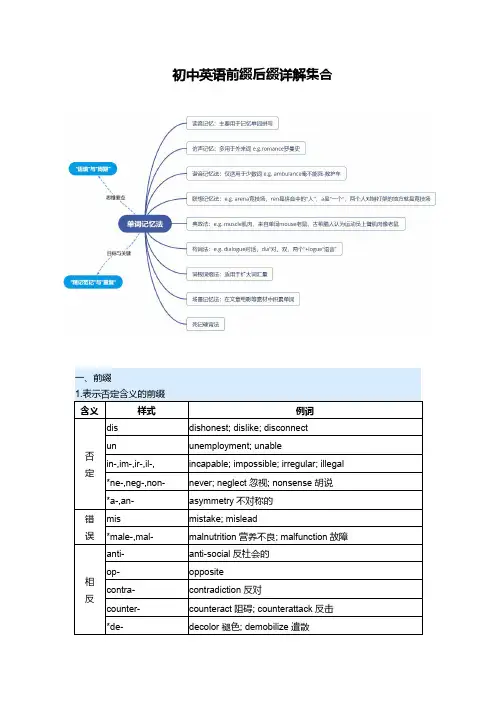
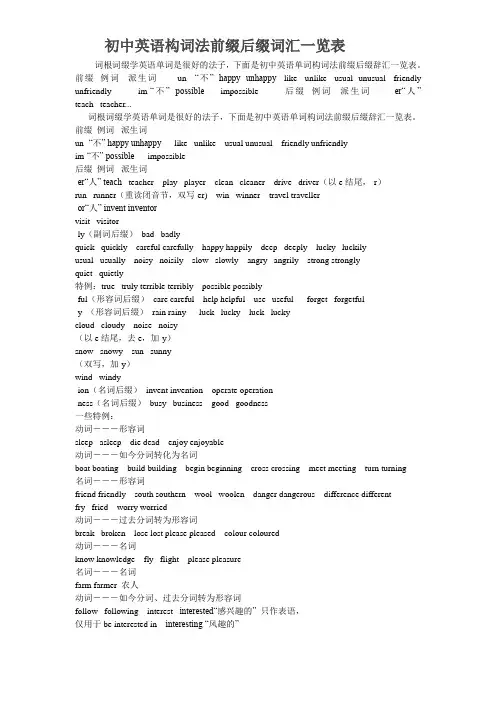
初中英语构词法前缀后缀词汇一览表词根词缀学英语单词是很好的法子,下面是初中英语单词构词法前缀后缀辞汇一览表。
前缀例词派生词un- “不” happy unhappy like unlike usual unusual friendly unfriendly im-“不” possible impossible 后缀例词派生词-er“人” teach teacher...词根词缀学英语单词是很好的法子,下面是初中英语单词构词法前缀后缀辞汇一览表。
前缀例词派生词un- “不” happy unhappy like unlike usual unusual friendly unfriendlyim-“不” possible impossible后缀例词派生词-er“人” teach teacher play player clean cleaner drive driver(以e结尾,-r)run runner(重读闭音节,双写-er) win winner travel traveller-or“人” invent inventorvisit visitor-ly(副词后缀)bad badlyquick quickly careful carefully happy happily deep deeply lucky luckilyusual usually noisy noisily slow slowly angry angrily strong stronglyquiet quietly特例:true truly terrible terribly possible possibly-ful(形容词后缀)care careful help helpful use useful forget forgetful-y (形容词后缀)rain rainy luck lucky luck luckycloud cloudy noise noisy(以e结尾,去e,加-y)snow snowy sun sunny(双写,加-y)wind windy-ion(名词后缀)invent invention operate operation-ness(名词后缀)busy business good goodness一些特例:动词---形容词sleep asleep die dead enjoy enjoyable动词---如今分词转化为名词boat boating build building begin beginning cross crossing meet meeting turn turning名词---形容词friend friendly south southern wool woolen danger dangerous difference differentfry fried worry worried动词---过去分词转为形容词break broken lose lost please pleased colour coloured动词---名词know knowledge fly flight please pleasure名词---名词farm farmer 农人动词---如今分词、过去分词转为形容词follow following interest interested“感兴趣的” 只作表语,仅用于be interested in interesting “风趣的”可作表语和定语develop developed “蓬勃的”developing “发展中的”词根词缀学英语单词是很好的方法,下面是初中英语单词构词法前缀后缀词汇一览表。
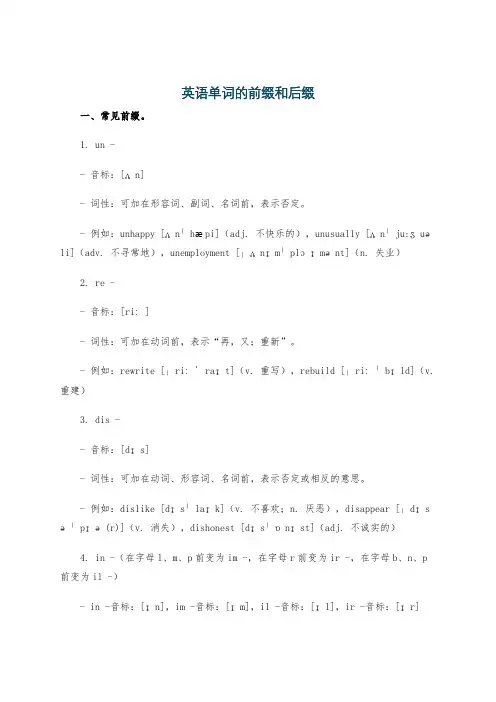
英语单词的前缀和后缀一、常见前缀。
1. un -- 音标:[ʌn]- 词性:可加在形容词、副词、名词前,表示否定。
- 例如:unhappy [ʌnˈhæpi](adj. 不快乐的),unusually [ʌnˈju:ʒuəli](adv. 不寻常地),unemployment [ˌʌnɪmˈplɔɪmənt](n. 失业)2. re -- 音标:[riː]- 词性:可加在动词前,表示“再,又;重新”。
- 例如:rewrite [ˌriːˈraɪt](v. 重写),rebuild [ˌriːˈbɪld](v. 重建)3. dis -- 音标:[dɪs]- 词性:可加在动词、形容词、名词前,表示否定或相反的意思。
- 例如:dislike [dɪsˈlaɪk](v. 不喜欢;n. 厌恶),disappear [ˌdɪs əˈpɪə(r)](v. 消失),dishonest [dɪsˈɒnɪst](adj. 不诚实的)4. in -(在字母l、m、p前变为im -,在字母r前变为ir -,在字母b、n、p前变为il -)- in -音标:[ɪn],im -音标:[ɪm],il -音标:[ɪl],ir -音标:[ɪr]- 词性:可加在形容词前,表示否定。
- 例如:inactive [ɪnˈæktɪv](adj. 不活跃的),impossible [ɪmˈpɒs əbl](adj. 不可能的),illegal [ɪˈliːgl](adj. 非法的),irregular [ɪˈreɡjələ(r)](adj. 不规则的)5. pre -- 音标:[priː]- 词性:可加在动词、名词、形容词前,表示“在……之前”。
- 例如:preview [ˈpriːvjuː](v. 预习;n. 预演),prewar [ˈpriːwɔː(r)](adj. 战前的)6. post -- 音标:[pəʊst]- 词性:可加在名词、形容词前,表示“在……之后”。
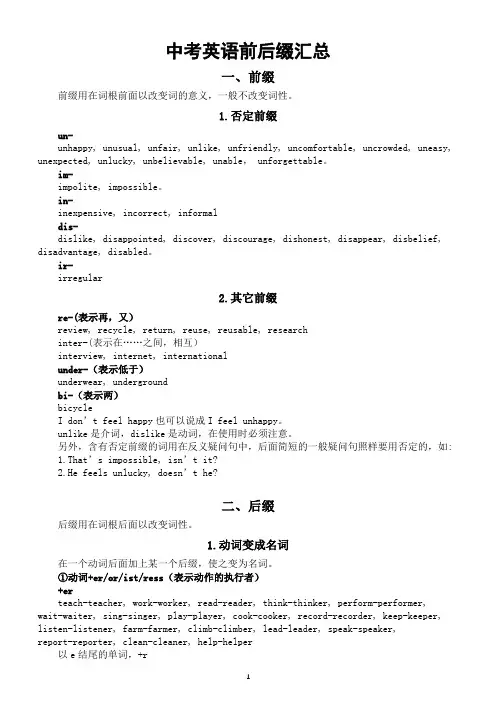
中考英语前后缀汇总一、前缀前缀用在词根前面以改变词的意义,一般不改变词性。
1.否定前缀un-unhappy, unusual, unfair, unlike, unfriendly, uncomfortable, uncrowded, uneasy, unexpected, unlucky, unbelievable, unable, unforgettable。
im-impolite, impossible。
in-inexpensive, incorrect, informaldis-dislike, disappointed, discover, discourage, dishonest, disappear, disbelief, disadvantage, disabled。
ir-irregular2.其它前缀re-(表示再,又)review, recycle, return, reuse, reusable, researchinter-(表示在……之间,相互)interview, internet, internationalunder-(表示低于)underwear, undergroundbi-(表示两)bicycleI don’t feel happy也可以说成I feel unhappy。
unlike是介词,dislike是动词,在使用时必须注意。
另外,含有否定前缀的词用在反义疑问句中,后面简短的一般疑问句照样要用否定的,如:1.That’s impossible, isn’t it?2.He feels unlucky, doesn’t he?二、后缀后缀用在词根后面以改变词性。
1.动词变成名词在一个动词后面加上某一个后缀,使之变为名词。
①动词+er/or/ist/ress(表示动作的执行者)+erteach-teacher, work-worker, read-reader, think-thinker, perform-performer,wait-waiter, sing-singer, play-player, cook-cooker, record-recorder, keep-keeper, listen-listener, farm-farmer, climb-climber, lead-leader, speak-speaker,report-reporter, clean-cleaner, help-helper以e结尾的单词,+rwrite-writer, drive-driver, dance-dancer, ride-rider, rule-ruler, manage-manager, make-maker重读闭音节词词尾只有一个辅音字母,元音发短音时,双写尾字母,再+errun-runner, win-winner, travel-travel(l)er+orvisit-visitor, act-actor, invent-inventor, compete-competitor,translate-translator, direct-director+isttour-tourist+resswait-waitress, act-actress②动词+tionact-action, suggest-suggestion, communicate-communication, invite-invitation, pollute-pollution, compete-competition, predict-prediction, invent-invention, prepare-preparation, protect-protection, celebrate-celebration, direct-direction, educate-education, examine-examination, inspire-inspiration, introduce-introduction, produce-production, graduate-graduation, pronounce-pronunciation③动词+ingdraw-drawing, paint-painting, build-building,say-saying ,cross-crossing,happen-happening, end-ending, mean-meaning, feel-feeling, begin-beginning,open-opening④动词+mentagree-agreement, disagree-disagreement, develop-development, improve-improvement, encourage-encouragement, punish-punishment, achieve-achievement, manage-management⑤动词+anceappear-appearance, disappear-disappearance⑥动词+sionexpress-expression, discuss-discussion, decide-decision在句子中,如果作主语、宾语、表语,就要把动词改为名词。
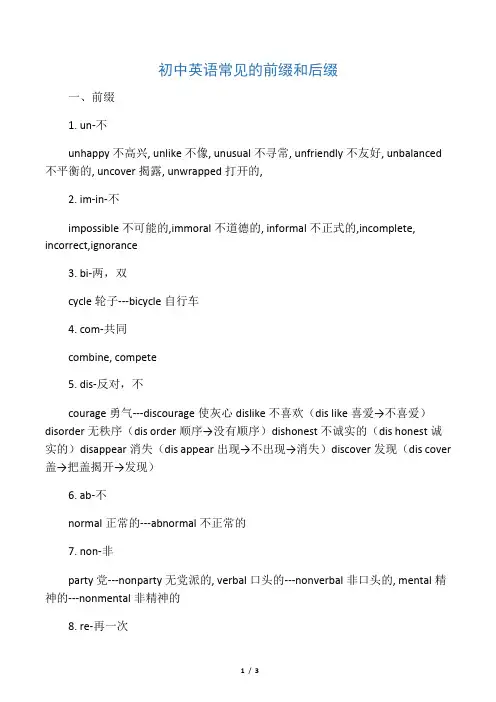
初中英语常见的前缀和后缀一、前缀1. un-不unhappy不高兴, unlike不像, unusual不寻常, unfriendly不友好, unbalanced 不平衡的, uncover揭露, unwrapped打开的,2. im-in-不impossible不可能的,immoral不道德的, informal不正式的,incomplete, incorrect,ignorance3. bi-两,双cycle轮子---bicycle自行车4. com-共同combine, compete5. dis-反对,不courage勇气---discourage使灰心dislike不喜欢(dis like喜爱→不喜爱)disorder无秩序(dis order顺序→没有顺序)dishonest不诚实的(dis honest诚实的)disappear消失(dis appear出现→不出现→消失)discover发现(dis cover 盖→把盖揭开→发现)6. ab-不normal正常的---abnormal不正常的7. non-非party党---nonparty无党派的, verbal口头的---nonverbal非口头的, mental精神的---nonmental非精神的8. re-再一次view观看---review再一次观看-引申为复习,评论action行动—reaction反应,replay(re play播放→重放,回放)二、后缀1. -less没有(形容词后缀)例:careless粗心的, hopeless没有希望的, count数---countless数不清的, homeless无家可归的, endless无止境的,无尽的, useless没用的, helpless无助的2. -ful充满的(形容词后缀)careful(care关心ful→小心的,认真的), colorful五彩缤纷的, meaningful 有意义的, wonderful(wonder奇迹ful→精彩的), beautiful美丽的,successful成功的,useful有用的的,forgetful健忘的3. -ment行为(名词后缀)excitement兴奋(excite使兴奋ment→兴奋), enjoyment喜欢, movement 运动,development发展, treatment对待,治疗, entertainment娱乐, disappointment失望,encouragement鼓4. -ive(形容词后缀)effective(effect效果ive→有效的), subjective主观的, objective客观的5. -er(表人的后缀)Teacher老师, cleaner清洁工, runner跑步者, traveler旅行者, winner赢家, singer歌手, writer作家,driver司机, worker工人, leader领导, foreigner外国人, farmer农民6.-or(表人的后缀)actor演员, inventor发明家, visitor参观者7.-ist(表人的后缀)Tourist观光者, dentist牙医,guitarist吉他手8.-ly(副词后缀)Badly坏地, quickly快地, carefully认真地,仔细地, happily高兴地, deeply深深地lucky ---luckily幸运地usual---usually通常地noisy---noisily有噪音地slow--- slowly慢慢地angry ---angrily生气地strong--- strongly强烈地quiet ---quietly静静地特例:(以不发音的e结尾的形容词,去掉e再加ly)true ---trulyterrible ---terriblypossible ---possibly9.-y(形容词后缀)rain rainy下雨的; luck lucky幸运的;cloud cloudy多云的; noise noisy有噪音的;wind windy刮风的; health healthy健康的; snow snowy下雪的(双写,加-y)sun sunny晴朗的10.-ion(名词后缀)invent invention发明; educate, education教育; graduate, graduation毕业;relate,relation关系;operate, operation操作; instruct, instruction指导; translate,translation翻译; inform通知--- information信息; direct指向--- direction 方向;suggest, suggestion建议11.-ness(名词后缀)good goodness好意; brave勇敢的,bravery, braveness(勇敢,华饰);nervous 紧张的,nervousness; nerve神经。
九年级所学词缀知识点词缀是构成词语的重要组成部分,通过添加前缀或后缀,可以改变词汇的意义和词性,丰富语言表达。
在九年级的学习中,我们学习了一些常见的词缀,它们在词汇扩展和理解上起到了重要的作用。
以下是九年级所学的一些常见词缀知识点。
一、前缀1. 无(un-)无(un-)是一个常见的否定前缀,用于表示否定、相反、不足等含义。
例如:非常(unusual)、不适合(unsuitable)、不利(unfavorable)2. 相反(dis-)相反(dis-)是表示相反、背离、分离等含义的前缀。
例如:不一致(disagree)、不和(dislike)、不同意(disagree)3. 全(ex-)全(ex-)表示超出、离开、以及过去的含义。
例如:超过(exceed)、退出(exit)、以往(ex-boyfriend)4. 反(anti-)反(anti-)表示反对、对抗等含义,来自希腊语。
例如:反对(anti-establishment)、抗议(anti-war)、对抗(antidote)二、后缀1. 增加(-ment)增加(-ment)是名词后缀,用于表示行为、状态、结果。
例如:装备(equipment)、建议(advice)、发展(development)2. 形容词(-ful)形容词(-ful)是后缀,表示“充满某种特点”的意思。
例如:美丽的(beautiful)、成功的(successful)、有希望的(hopeful)3. 动词(-ize)动词(-ize)是后缀,用于动词后,表示使动作发生或使成为。
例如:民主化(democratize)、数字化(digitize)、实现(realize)4. 人(-er)人(-er)是名词后缀,用于表示从事某种职业或具有某种特征的人。
例如:教师(teacher)、演员(actor)、记者(reporter)三、前缀和后缀的变化有些前缀和后缀在不同词性之间转化时,会有一定的变化。
英语常用的328个前后缀前缀1 、a- 加在单词或词根前面, 表示:不,无,非2 、a- 加在单词前, 表示:在..., ...的3 、ab-, abs- 加在词根前,表示:相反,变坏,离去等4 、ab-, ac-, ad-, af-, ag-, an-, ap-, ar-, as-, at- 等加在同辅音字母词根前,表示一再等加强意5 、ad- 加在单词或词根前, 表示做....., 加强......6 、amphi- 表示:两个、两种7 、an- 在词根前, 表示:不,无8 、ana- 表示:错误,在旁边,分开9 、ante- 表示:前面,先10 、anti- 表示:反对,相反11 、apo- 表示:离开,远离12、auto- 表示:自动、自已13 、be- 构成动词,表示:使......成为14 、be- 构成一些介词15 、bene- 表示:善, 好16 、bi- 表示:二个, 两17 、by- 表示:在旁边,副的18 、cata- 表示:向下,相反,离开19 、circum- 表示:环绕,周围20、co- 表示:共同,通常放元音词根前21 、col-, cor- 在同辅音词根前, 表示:共同22 、com-, con- 表示:共同23 、contra - 表示:反对,相反24 、counter - 表示:反对,相反25 、de- 表示:去掉,变坏,离开,变慢,向下等26 、de- 表示:使....成为,加强等27 、deca- 表示:十28 、deci- 表示:十分之一29 、demi- 表示:半30 、di- 表示:二个,双31 、di- 表示:使...变成,分开,离开32 、dia- 表示:穿过,二者之间33 、dif- 和辅音重复表示:不,否定,分开34 、dis- 表示:不,消失掉35 、dis- 表示:分开,分离36 、dys- 表示:坏,不良37 、e-, ef- 表示:出,出来,38 、em-, en-, 表示:进入... 之中,包围39 、em-,en-, 表示:使..... 进入状态40 、endo- 表示:内部41 、epi- 表示:在...上,在...周围,在...后面42 、eu- 表示:好,优秀43 、ex- 表示:出,出去44 、ex- 表示:前面的,前任的45 、exo- 表示:外部的,外面46 、extra- 表示:以外的,超过的47 、fore- 表示:前面,预先48 、hecto- 表示:百,许多49 、hemi- 表示:半50 、hepta- 表示:七51 、hetero- 表示:异类,异种52 、hexa- 表示:六53 、holo- 表示:全部54 、homo- 表示:同类的55 、hyper- 表示:超过,太多56 、hypo- 表示:下面,次等57 、il-, ir- 辅音重复表示:不,无58 、il-,ir- 表示:使.....成为,进入59 、im-, in- 表示:不,无,非60 、im-,in- 表示:向内,进入61 、inter- 表示:在..... 之间,相互62 、intra- 表示:在内,内部63 、intro- 表示:向内,入内64 、iso- 表示:等, 同65 、kilo- 表示:一千66 、macro- 表示、宏传,大67 、mal-; male 表示、坏,恶68 、meta- 表示:超过, 改变69 、micro- 表示:微,小70 、milli- 表示:千,千分之一71 、mini- 表示:小72 、mis- 表示:错误,坏73 、mono- 表示:单个,一个74 、multi- 表示、多,很多75 、neo- 表示:新的76 、non- 表示:不,非77 、ob- 表示:逆,倒,加强意义78 、octa- 表示:八 ; 亦作octo79 、omni- 表示:全部,到处80 、out- 表示:超过,过度81 、out- 表示:出去,过时82 、over- 表示:过度,过份83 、over- 表示:翻转84 、over- 表示:在... 之上85 、paleo- 表示:古,旧86 pan- 表示广泛的87 para- 表示半,类似,辅助88 、para- 表示、旁边89 、para- 表示:降落伞90 、pen- 表示:近似,差不多91 、penta- 表示:五92 、per- 表示:贯穿,自始至终93 、per- 表示:假,坏94 、peri- 表示:周围,靠近95 、poly- 表示:多96 、post- 表示:在后面97 、post- 表示:邮件,邮政98 、pre- 表示:...前的,预先99 、pro- 表示:赞同,亲... 100 、pro- 表示:向前,在前101 、pro- 表示:很多...102 、proto- 表示:原始... 103 、pseudo- 表示:假,伪104 、quadri-,quadru- 表示:四105 、quasi- 表示:类似,准106 、re- 表示:向后,相反107 、re- 表示:一再,重新108 、retro- 表示:向后,倒退109 、se- 表示:分开,离开,区别开110 、semi- 表示:半111 、sept-,septi- 表示:七112 、sex-, sexi- 表示:六113 、step- 表示:后,继或前夫(妻)所生114 、stereo- 表示:立体115 、sub- 表示:在下面,次一等,副手116 、sub- 表示:接近,靠近117 、suc-, suf-, sup-, sur- 等辅音重复表示:在...下面118 、super- 表示:在...上面119 、super- 表示:超级,超过,过度120 、supra- 表示:超...121 、sur- 辅音不重复表示:超过,在上面122 、sus- 表示:在... 下面123 、sym-, syn- 表示:共同,相同124 、tetra- 表示、四125 、trans- 表示:横过,越过126 、trans- 表示:变换,改变';转移127 、tri- 表示:三128 、twi- 表示:二、两129 、ultra- 表示:极端130 、ultra- 表示:超出,超过131 、un- 表示:不,无,非,没有132 、un- 表示:打开,解开,弄出133 、under- 表示:在...下,在...之内134 、under- 表示:不足,不够135 、under- 表示:副手 3136 、uni- 表示:一个、单一137 、vice- 表示:副138 、with- 表示:向后,相反后缀139 、-ability 表名词,能...;性质140 、-able 表形容词,可...的,能...141 、-ably 表副词,能...地142 、-aceous 表形容词,具有...特征的143 、-acious 表形容词,有特征的,多...的144 、-acity 表名词,有...倾向145 、-acle 表名词, ... 物品,状态146 、-acy 表名词, ...性质,状态147 、-ad 表名词, ...东西,状态148 、-ade 表名词, 表示:状态,物品149 、-ade 表示:个人或集体150 、-age 表示:费用151 、-age 表示:场所,物品152 、-age 名词后缀,表示:状态,总称153 、-ain 表名词, ...人154 、-air 表名词,人、物155 、-aire 表名词, ...人156 、-al 表形容词, ...的157 -al 表名词,人,物,状态158 -ality 表名词,状态,性质159 -ally 表副词,由al ly 构成, ...地160 -an 表名词和形容词, ...地方,...人161 -ance 表名词,性质,状况162 -aneity 表名词,表示性质,状态163 -aneous 表形容词, ...有; ...特征的164 -ant 表形容词, ...的165 -ant 表名词, ...人166 -ant 表名词, ...剂167 -ar 表形容词, ...的168 -ard 表名词,不好的人169 -arian, 表形容词或名词, ...的(人) 170 -arium 表名词,地点,场所171 -ary 表名词,人,场所,物172 -ary 表形容词, ...的173 -ast 表名词, ...人,物174 -aster 表名词,不怎么样的人175 -ate 表动词,做,造成176 -ate 表形容词,具有...的177 -ate 表名词,人或地位178 -atic 表形容词,有...性质的179 -ation 表名词,行为,过程,结果180 -ative 表形容词,有...倾向(性质)的181 -ator 表名词,通常由ate结尾的动词而来,做事的人或物182 -atory 表名词场所,地点183 -atory 表形容词,有...性质的184 -cy 表名词,也作-acy, 性质,状态185 -dom 表名词,状态或领域186 -ee 表名词,被动或主动的人187 -eer 表名词, ... 人员188 -el 表名词,人或物189 -en 表动词,变成190 -en 表形容词,由...制成的,通常加在名词后面191 -en 表名词,人或物192 -ence 表名词,性质,状态193 -ency 表名词,ence 的变体194 -enne 表名词,女性195 -ent 表形容词, ...的196 -ent 表名词, ...药剂197 -ent 表名词, ...人198 -eous 表形容词,有...的199 -er 表动词,反复做200 -er 表名词,物品,机器201 -er 表名词, ...人202 -ern 表形容词, ...方向的203 -ern 表名词, ...场所204 -ery 表名词,场所,地点205 -ery 表名词,行为,情况206 -esque 表形容词,如...的207 -ess 表名词,女性,雌性208 -et 表名词,小东西209 -etic 表形容词,属于...的210 -ette 表名词,小的东西或状态211 -ety 表名词,状态212 -eur 表名词, ...人213 -faction 表名词,达到的状态,由-fy转化而来214 -fic 表形容词,产生...的215 -fication 表名词,由fic变化而来216 -fier 表名词,人或物,由-ify转化而来217 -fold 表形容词或副词,倍,双重218 -form 表形容词,有...形状的219 -ful 表形容词, 有...的220 -ful 表名词, 满,量221 -fy 表动词, ...化,成为... ,更多时候作 -ify 222 -hood 表名词, 时期,性质等223 -ia 表名词, 某种病224 -ia 表名词, 总称,状态225 -ial 表形容词,有...的226 -ian 表名词,某种人227 -ian 表形容词, ...国家的228 -ibility 表名词,具备...性质的229 -ible 形容词能...的230 -ic 表形容词, ....的,有时作-tic 231 -ic 表名词,某种药232 -ic 表名词,人或学科233 -ical 表形容词, ...的234 -ice 表名词,行为,状态235 -ics 表名词,学科,学术236 -id 表形容词,如...的237 -ie 表名词,小东西或人238 -ier 表名词,人或物239 -ile 表形容词, ...的240 -ile 表名词,物体241 -ine 表形容词, ...的242 -ine 表名词,人或女人243 -ine 表名词,状态, 药物等244 -ing 表形容词,正...的,令人...的245 -ing 表名词,行业246 -ing 表名词,物品247 -ing 表名词,状态248 -ion 表名词,动作或状态分为 --sion和--tion两种249 -ion 表示某种物,用品250 -ior 表形容词,较...的251 -ious 表形容词, ....的252 -ise 表动词后缀,和 -ize 相同,是 -ize 的变体, ...化253 -ise 表名词,物品,状态254 -ish 表形容词,象...一样,有的... ,通常放在一具体名词后255 -ish 表动词,造成...256 -ish 表示国家的或语言257 -ism 表示学术或学术流派258 -ism 表示行为, 现象,状态259 -ism 表示疾病260 -ism 表示具备某种性质261 -ism 名词,表示各种主义,宗教262 -ist 表名词,表示信仰者,专家或从事人263 -ist 以-ist 结尾的单词,不少同时可做名词和形容词用。
中学阶段必须掌握的前后缀(八一学校张运学)中学阶段必须应该掌握的14个最基本的前缀1.a-- = in, on 在…之中;在…之上aboard adv. (= on board) abroad adv. across prep./ adv. ahead adv. ( = on head) alive adj. around adv./ prep. asleep adj./adv. away adv.a—加强语气用,表示动作的开始或结束alike adj./ adv. aloud adv. amaze v. awake v.ashamed adj. arise v. amount v./ n. avenue n.2. en-- = at, in, into, near, on 进入某种状态,使成为encourage (= give courage to) v.enlighten (= give light to) v.entitle (= give a title to ) v.enlarge (= make large) v.enrich (= make rich) v.enable v. endanger v.envelope n. environment n.3. re – = back; again 回,相反; 再,重复,重新recall recite return reject respectrenew reprint rebuild remarry reuse recyclereunite reunion retell replace recreaterestore rewrite reconsider rebirth research相反,反对reaction resist4. dis- = apart; away; not 离开;否定;(不,无,相反)dislike disagree disorder discontinuedishonest disappear disability discomfortdiscourage disable disadvantage disappoint5. mis- = bad(ly); ill; wrong(ly) 一般是以带有“贬义”的语气表示错误,也可单表“否定”(误,错,恶,不)misarrange v. misbehave v. misfortune n.mislead v. misplace v. mistake n. ( = wrongly + get)mistrust n./ v. misunderstand v. misspellmishear misread misremember mistreat6. un- 不Unreal uncomfortable unfriendly unhappyUnfortunately unfit unfair无Unconditional unlimited非Unjust unofficial未Uncorrected unchanged unfinished undecided unknown 相反动作取消,除去Uncover unlock untie7. non- 不;非;无Nonsmoker nondrinker no cooperation nonstop8. in—Incorrect incomplete inhuman injustice informalInfamous invisible innutrition inefficient9 il—Illegal illogical illiterate10. ir—Irregular irreligious irresistible irresponsible11. im- (用在b,m,p之前)Impossible imperfect impolite imbalance impatient impractical12. inter --- = between, among 相互,之间International interpersonal internet interrupt intervene13. tele = far off 远距离;远程Telephone telescope telegram telegraph television telegraph14. kilo- Kilometer kilogram中学阶段必须应该掌握的(20+16+3+5+3=)47个最基本的后缀20个基本名词后缀1. ---age package postage courage2. ---er farmer thinker3. ---or visitor conductor editor governor4. ---ar beggar liar scholar5. –ese Chinese Japanese6. –ian musician Asian Russian7. –ist artist pianist scientist communist8. –ism communism Marxism modernism9. ---ty (–ity, --ety) cruelty loyalty safety ability purity anxiety variety10. –ment government movement development11. –ness business illness darkness12. –ion invention liberation education discussion13. –al arrival survival trial14. –ship friendship fellowship scholarship relationship15. ---dom freedom kingdom16. ---ess actress hostess empress princess17. –th growth warmth strength18. –ance (--ence) absence appearance confidence innocence silence19. –hood childhood brotherhood neighborhood16个基本形容词后缀1. –al physical national political2. –an American Italian Australian3. –able /--ible reasonable comfortable horrible possible4. –ed excited moved frightened5. –ing boring tiring interesting6. –ern southern northern eastern7. –ful helpful useful careful8. –ish foolish English bookish childish9. –ive active instructive expensive10.—less careless useless harmless helpless11. ---ous poisonous mountainous dangerous12. ---y cloudy windy dirty13. –ic academic alcoholic energetic14. –ly friendly monthly manly15. –proof soundproof waterproof fireproof16. –some quarrelsome tiresome troublesome3个基本副词后缀1. –ly actually shortly badly angrily2. –ward(s) towards forward outward southwards3. –s besides indoors outdoors sometimes5个基本动词后缀1. –en golden wooden widen blacken2. –(i)fy beautify terrify satisfy3. –ize/--ise apologize organize realize4. –ate assassinate celebrate congratulate isolate5. –ish cherish publish punish blush3个数词后缀1. –teen fourteen fifteen eighteen2. –ty forty fifty ninety3. –th twelfth twentieth ninth补充拓展前缀前pro-- protect programpre-- predict previewfore-- foresee forehead后post-- postwar postscript超越;在上super-- superhero superstarsur--- surface surviveover-- overlook overflow往下;在下;不全de-- decrease destructunder--- underground underdevelopedsup/sub--- suppose subway subtitle内in/im-- include import impress外ex--- export express中间inter--/intro--- international internet introduction internal反对ob/op--- object oppressanti--- antiwar antibiotic Antarctic共同com/cor/col/con--- compose combine correct corrupt collect conclude表示“一”拉丁文前缀:un--/ uni--unify vt. union n.uniform n.希腊文前缀mono—monologue n. monopoly n.表示“二”bi—biplane n. bilingual adj. bicycle n.di—dialogue n. dilemma n.divorce n./vt. divide v.表示“三”tri—triple adj. triangle n.trinity n. (Trinity College)trivialunique project impress reaction destruction联想记忆法chill image spark snowflake trail isolate一读nutrition curse pest famine ambulance hacker spider二拼schedule leisure innocent hesitate fashion三变形garage gloom四拆discipline scream fate bride bridegroom trivial vicar bishop五分drown poise routine六开屏engine rub temper。
英语单词常见前后缀总结1.前缀:- un-: 表示"不"或"否定",例如:unhappy(不快乐),unfair(不公平)- re-: 表示"再一次"或"重新",例如:rewrite(重写),replay (重新播放)- pre-: 表示"之前"或"预先",例如:prepaid(预付的),preheat (预热)- dis-: 表示"相反"或"分离",例如:dislike(不喜欢),disconnect(断开连接)- mis-: 表示"错误"或"不正确",例如:misunderstand(误解),misbehave(行为不当)2.后缀:- -ly: 表示"以...的方式"或"具有..."的性质,例如:quickly(快速地),happily(快乐地)- -ful: 表示"具有..."或"充满...",例如:peaceful(和平的),thankful(感激的)- -ment: 表示"行为"或"状态",例如:agreement(协议),achievement(成就)- -ist: 表示"从事..."或"专家",例如:artist(艺术家),scientist(科学家)3.前缀和后缀的组合:- un- + -able: 表示"无法...",例如:unforgettable(难以忘怀的),unbreakable(不可破坏的)- re- + -ment: 表示"再一次的行为"或"重新...",例如:replacement(更换),reinvestment(重新投资)- pre- + -ful: 表示"先前的..."或"预先充满...",例如:prejudice(偏见),precautionful(慎重的)需要注意的是,虽然这其中有一些常见前后缀的意义是固定的,但有些前后缀的意义可能会根据具体词语的上下文而有所改变。
初中英语词缀归纳总结英语词缀是构成英语单词的基本元素之一,它们可以改变单词的词性、含义以及语法功能。
在初中英语词汇学习中,了解和掌握常见的词缀对于提高词汇量和理解词汇的构成有着重要的作用。
本文将对初中英语中常见的几种词缀进行归纳总结。
一、前缀(Prefix)前缀是在单词的开头加上的一种词缀,它可以改变单词的意思或者词性。
以下是初中英语常见的前缀:1. un-:表示否定、相反,如unhappy(不开心的)、uncertain(不确定的)。
2. re-:表示重新或再次,如return(返回)、rewrite(重写)。
3. dis-:表示不、否定,如dislike(不喜欢)、disagree(不同意)。
4. pre-:表示在前、之前,如pretest(预测)、preview(预览)。
二、后缀(Suffix)后缀是在单词的结尾加上的一种词缀,它可以改变单词的意思、词性或者形态。
以下是初中英语常见的后缀:1. -ful:表示充满、有...特征的,如beautiful(美丽的)、careful(小心的)。
2. -less:表示没有、缺乏,如hopeless(绝望的)、useless(无用的)。
3. -er:表示人或物的职业、身份,如teacher(教师)、writer(作家)。
4. -able:表示能够、有能力的,如comfortable(舒适的)、understandable(可理解的)。
三、词根(Root)词根是单词中最基本、最核心的部分,它能够表达一个单词的基本意思。
了解常见的词根有助于我们理解和记忆单词。
以下是一些常见的词根及其意思:1. bio-:表示生命,如biology(生物学)、biography(传记)。
2. tele-:表示远程、远距离,如television(电视)、telephone(电话)。
3. aud-:表示听、听觉,如audio(音频)、audience(观众)。
4. graph-:表示写、描述,如graphite(石墨)、graphic(图表)。
初中英语单词常用词缀及前缀后缀词汇一览表初中英语常用词缀汇总一、常用的前缀主要有:ab 表示反常如:absent 缺席abnormal 不正规的ap 表示添加如:append 悬挂apposition 同位置bi 表示两、重如:bicycle 自行车bigamy 重婚com 表示共同如:combine 联合compete 相争dis 表示分开如:disarm 裁军dislike 讨厌im 表示不如:impossible不可能的immoral 不道德的in 表示不、向内如:informal 非正式的inhuman 不人道的non 表示无如:nonparty 无党派的nonmetal 非金属pro 表示向前如:progress 进步prognostic 预兆re 表示回、重新如:review 复习reaction 反应un 表示不、非如:unhappy 不快乐的unbalance 失去平衡二、常用的后缀主要有:al 表示人、物如:rival 竞争者mural 壁画cy 表示状态、职位如:bankruptcy 破产captaincy 船长er 表示人、物如:teacher 老师cooker 厨具able 表示可能的如:movable 可移动的passable 可通行的ful 表示充满如:beautiful 美丽的useful 有用的or 表示人、物如:actor 男演员mirror 镜子ist 表示人如:copyist 抄写员socialist 社会主义者ment 表示行为如:enjoyment 娱乐movement 运动ing 表示令人如:exciting 令人兴奋的interesting 令人有兴趣的ed 表示感到如:excited 感到兴奋的interested 感到有兴趣的less 表示没有的如:resistless 不抵抗的homeless 无家可归的ly 副词后缀如:gently 轻轻地intently 专心地tion 名词后缀如:graduation 毕业relation 亲属3、典型的前后缀应用举例:1、excite vt.刺激exciting adj. 令人兴奋的excited adj.感到兴奋的excitement n.兴奋2、smile v./n.微笑smiling adj. 微笑的smilingly adv.微笑的unsmiling adj.不笑的初中英语单词构词法前缀后缀词汇一览表【前缀】un- “不”happy unhappylike unlikeusual unusualfriendly unfriendlyim-“不”possibleimpossible【后缀】-er“人”teach teacherplay playerclean cleanerdrive driver(以e结尾,-r)run runner(重读闭音节,双写-er)win winnertravel traveller-or“人”invent inventorvisit visitor-ly(副词后缀)bad badly / quick quickly careful carefully / happy happily deep deeply / lucky luckily usual usually noisy noisily slow slowly / angry angrilystrong strongly /quiet quietly 【特例】true trulyterrible terriblypossible possibly-ful(形容词后缀)care carefulhelp helpfuluse usefulforget forgetful-y (形容词后缀)rain rainyluck luckycloud cloudynoise noisy(以e结尾,去e,加-y) snow snowysun sunny(双写,加-y)wind windy-ion(名词后缀)invent inventionoperate operation-ness(名词后缀)busy businessgood goodness【一些特例】动词---形容词sleep asleepdie deadenjoy enjoyable动词---现在分词转化为名词boat boatingbuild buildingbegin beginningcross crossingmeet meetingturn turning名词---形容词friend friendlysouth southernwool woolendanger dangerous difference differentfry friedworry worried动词---过去分词转为形容词break brokenlose lost please pleased colour coloured动词---名词know knowledgefly flightplease pleasure名词---名词farm farmer 农夫动词---现在分词、过去分词转为形容词follow followinginterest interested“感兴趣的”只作表语,仅用于be interested ininteresting “有趣的”可作表语和定语develop developed “发达的”developing “发展中的”词根词缀记忆法常常被英语初学者所忽略,如果将此法配合多遍反复记法在自学中应用则可以做到举一至少反三的妙用,词根词缀组成规律亦是英语专业中词汇学必讲必学的一门课程。